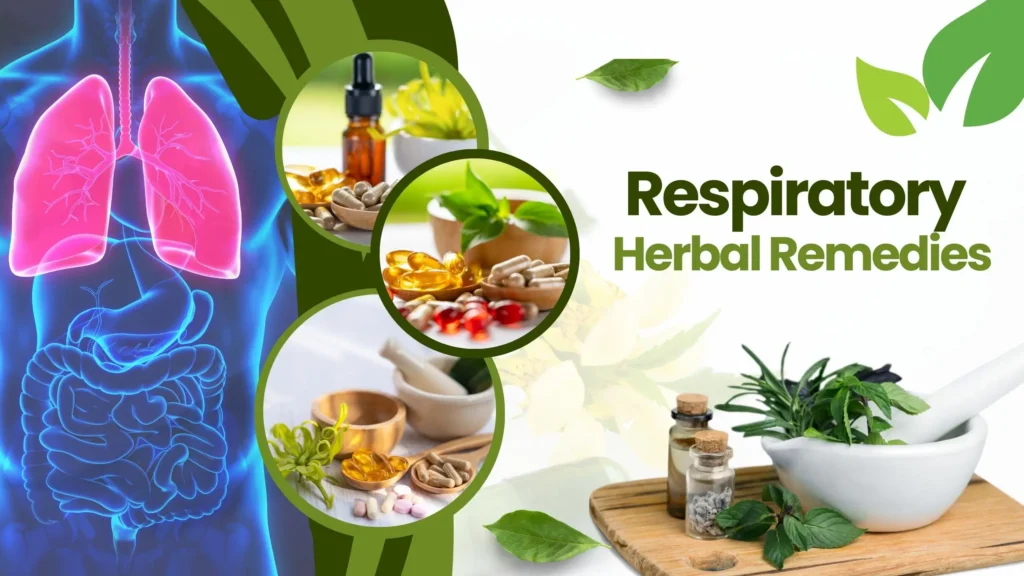Respiratory issues, such as asthma, bronchitis, and seasonal allergies, can significantly impact daily life. While modern medicine offers various treatments, nature has provided us with powerful respiratory herbal remedies that have been used for centuries. One such surprising natural solution is a simple leaf that can work wonders for lung health. See the incredible benefits of this natural remedy and how it can improve respiratory wellness.
- What is Respiratory issues & Causes?
- How Herbal Remedies Improve Respiratory Function
- Natural Herbs for Respiratory Support
- How to Use Herbal Leaves for Respiratory Health
- Benefits of Natural Remedy for Respiratory Wellness
- Daily Herbal Practices to Maintain Strong and Healthy Lungs
What is Respiratory Issues & Causes?
Respiratory issues refer to conditions that affect the lungs and airways, making it difficult to breathe properly. These problems can range from mild discomfort to severe chronic conditions that impact overall health and quality of life. Some of the most common respiratory ailments include asthma, bronchitis, pneumonia, and chronic obstructive pulmonary disease (COPD) symptoms.
Several factors contribute to respiratory problems, including:
- Air pollution and exposure to toxins: Prolonged exposure to polluted air, industrial fumes, and chemical toxins can damage lung tissues and exacerbate respiratory conditions.
- Allergies and irritants like dust and pollen: Allergic reactions to airborne allergens such as dust mites, pollen, mold spores, and pet dander can trigger inflammation in the airways, leading to breathing difficulties.
- Viral or bacterial infections: Respiratory infections like the flu, common cold, pneumonia, and tuberculosis can cause lung inflammation, leading to congestion and breathing issues.
- Smoking and secondhand smoke: Smoking damages lung tissues and weakens the respiratory system, while exposure to secondhand smoke can lead to similar issues, increasing the risk of chronic diseases.
- Weak immune system and genetic predisposition: Individuals with weakened immune systems or a family history of respiratory diseases are more susceptible to lung conditions, making preventative measures essential.
How Herbal Remedies Improve Respiratory Function
For centuries, herbal remedies have been used to enhance respiratory function, supporting lung health and improving breathing. These natural treatments work through various mechanisms, such as clearing mucus, reducing inflammation, combating infections, and strengthening lung capacity. Know these benefits in detail.
1. Clearing Mucus Buildup
Mucus buildup in the lungs and airways can lead to congestion, making breathing difficult. Certain herbs act as expectorants, helping to loosen and expel mucus from the respiratory tract.
- Eucalyptus: The primary compound in eucalyptus, cineole, is known for its decongestant properties. It helps break down thick mucus, allowing it to be expelled from the lungs.
- Licorice Root: This herb has demulcent properties, meaning it soothes and coats the throat while thinning mucus, making it easier to clear.
- Thyme: Traditionally used in cough remedies, thyme contains compounds that loosen mucus and help the body remove it from the lungs.
- Ginger: This common root has natural warming properties that stimulate mucus flow and reduce congestion.
2. Reducing Inflammation
Inflammation in the respiratory tract can cause swelling and restrict airflow, leading to conditions like asthma, bronchitis, or chronic obstructive pulmonary disease (COPD). Many herbs have powerful anti-inflammatory properties that help alleviate swelling in the airways.
- Turmeric: The active compound curcumin is a potent anti-inflammatory that can reduce lung irritation and improve breathing.
- Boswellia (Frankincense): Often used in traditional medicine, boswellia helps reduce inflammation in the bronchial passages, making breathing easier.
- Mullein: Known for its soothing effects, mullein reduces inflammation in the lungs and helps with conditions like asthma and coughs.
- Peppermint: Rich in menthol, peppermint relaxes the airway muscles and reduces inflammation, making it easier to breathe.
3. Fighting Infections
Bacterial and viral infections, such as colds, flu, and pneumonia, can severely impact respiratory function. Some herbs possess antimicrobial properties that help the body fight these infections naturally.
- Oregano: Contains carvacrol and thymol, two potent antimicrobial compounds that help fight respiratory infections.
- Garlic: Rich in allicin, garlic has antibacterial, antiviral, and antifungal properties that support immune function and clear infections.
- Echinacea: A well-known immune booster, echinacea helps prevent and reduce the severity of respiratory infections.
- Elderberry: Used for centuries to treat colds and flu, elderberry has antiviral properties that help shorten respiratory illnesses.
4. Strengthening Lung Function
Regular use of certain herbs can enhance lung function by improving oxygen uptake, reducing oxidative stress, and supporting tissue repair.
- Ginseng: Known for its adaptogenic properties, ginseng helps improve lung function and stamina by increasing oxygen supply to the body.
- Astragalus: Commonly used in traditional Chinese medicine, astragalus strengthens the lungs and improves immune response.
- Elecampane: This herb has been used for centuries to support lung health and improve oxygen absorption.
- Reishi Mushroom: A powerful adaptogen, reishi enhances lung capacity and reduces oxidative stress in lung tissues.
Natural Herbs for Respiratory Support
Various medicinal leaves and herbs have been used to promote lung health, improve breathing, and support overall respiratory function. These natural remedies contain powerful compounds that help clear congestion, reduce inflammation, fight infections, and strengthen lung tissues. Below is a detailed exploration of some of the most effective herbs for respiratory support.
1. Eucalyptus (Eucalyptus globulus)
Key Benefits:
- Contains cineole (eucalyptol), a natural decongestant and expectorant.
- Helps clear mucus from the airways.
- Has antimicrobial properties that fight respiratory infections.
- Supports lung function and reduces symptoms of asthma and bronchitis.
How It Works:
Eucalyptus is widely used in steam inhalations, chest rubs, and essential oils to help clear nasal and bronchial congestion. Cineole, its active compound, works by loosening mucus, making it easier to expel, while also reducing airway inflammation. Studies have shown that eucalyptus can help improve lung function in people with chronic obstructive pulmonary disease (COPD).
Best Ways to Use Eucalyptus:
- Steam inhalation: Add a few drops of eucalyptus essential oil to hot water and inhale the steam.
- Tea: Brew eucalyptus leaves in hot water for respiratory relief.
- Chest rub: Mix eucalyptus oil with a carrier oil and apply it to the chest to open airways.
2. Mullein (Verbascum thapsus)
Key Benefits:
- Acts as a natural expectorant, helping to remove mucus from the lungs.
- Soothes inflammation in the throat and bronchial tubes.
- Helps relieve symptoms of asthma, bronchitis, and chronic coughs.
- Supports overall lung function and improves oxygen uptake.
How It Works:
Mullein contains mucilage, a gel-like substance that coats and soothes irritated respiratory tissues. It also has mild antibacterial properties, making it effective against infections that cause congestion. Traditionally, mullein has been used in herbal medicine to treat respiratory conditions like pneumonia and tuberculosis.
Best Ways to Use Mullein:
- Tea: Steep dried mullein leaves in hot water and drink to ease congestion.
- Tincture: Take a mullein extract for long-term lung support.
- Steam inhalation: Breathe in vapors from mullein-infused water to clear mucus.
3. Tulsi (Holy Basil) (Ocimum sanctum)
Key Benefits:
- Has anti-inflammatory properties that reduce swelling in the airways.
- Acts as a natural immune booster, helping the body fight respiratory infections.
- Contains compounds that help reduce asthma symptoms and improve lung function.
- Has antioxidant properties that protect lung tissue from damage.
How It Works:
Tulsi (Holy Basil) has been a staple in Ayurvedic medicine for treating respiratory conditions such as coughs, colds, and bronchitis. It contains essential oils like eugenol and camphene, which help reduce airway inflammation and support lung health. Studies suggest that tulsi can improve lung function in people with asthma and respiratory allergies.
Best Ways to Use Tulsi:
- Tea: Boil fresh or dried tulsi leaves in water and drink daily for lung support.
- Tincture: Use a tulsi extract to strengthen the respiratory system.
- Raw leaves: Chew fresh tulsi leaves for immune and respiratory benefits.
4. Peppermint (Mentha piperita)
Key Benefits:
- Contains menthol, which helps relax airway muscles and improve airflow.
- Acts as a natural decongestant, breaking down mucus and phlegm.
- Has antimicrobial properties that fight bacterial and viral infections.
- Supports lung health by reducing symptoms of cough, colds, and asthma.
How It Works:
Peppermint is well known for its refreshing scent and cooling sensation, but its benefits go beyond that. The menthol in peppermint helps relax bronchial muscles, making it easier to breathe. It also works as an expectorant, thinning mucus and clearing congestion in the respiratory system.
Best Ways to Use Peppermint:
- Tea: Brew peppermint leaves in hot water and drink to relieve congestion.
- Essential oil: Add peppermint oil to hot water and inhale the steam for respiratory relief.
- Lozenges: Suck on peppermint lozenges to soothe the throat and open the airways.
5. Thyme (Thymus vulgaris)
Key Benefits:
- Acts as a natural expectorant, helping clear mucus from the lungs.
- Has antibacterial and antiviral properties that fight respiratory infections.
- Helps reduce coughing and bronchial irritation.
- Improves lung function and supports the immune system.
How It Works:
Thyme contains thymol, a powerful compound with antimicrobial properties that help eliminate pathogens from the respiratory tract. It also works as an expectorant, promoting mucus clearance and making breathing easier. Thyme has been used for centuries as a remedy for colds, bronchitis, and other respiratory ailments.
Best Ways to Use Thyme:
- Tea: Brew fresh or dried thyme leaves in hot water and drink to loosen mucus.
- Tincture: Take a thyme extract for stronger respiratory support.
- Steam inhalation: Add thyme to hot water and inhale the vapors to clear congestion.
How to Use Herbal Leaves for Respiratory Health
Herbal leaves have been used for centuries to support lung function, clear congestion, and promote overall respiratory wellness. Incorporating them into your daily routine is simple and effective, providing natural relief from common respiratory issues such as cough, congestion, asthma, and bronchitis. Below are some of the best ways to use herbal leaves to improve respiratory health.
1. Herbal Teas: Soothe and Strengthen the Respiratory System
Why It Works:
Herbal teas made from medicinal leaves help soothe the respiratory tract, reduce inflammation, and promote mucus clearance. Drinking herbal teas regularly can strengthen lung function, boost immunity, and relieve symptoms of colds, flu, and allergies.
Best Herbs for Respiratory Tea:
- Mullein Leaves: Soothes inflamed airways and clears mucus.
- Tulsi (Holy Basil): Acts as an expectorant and helps fight respiratory infections.
- Peppermint Leaves: Contains menthol, which relaxes airway muscles and enhances breathing.
- Thyme: A natural antibacterial herb that breaks up mucus and supports lung function.
- Eucalyptus Leaves: Opens up airways, making it easier to breathe.
How to Prepare Herbal Tea:
- Boil 1-2 teaspoons of fresh or dried herbal leaves in 1 cup of water for 5–10 minutes.
- Strain and allow the tea to cool slightly.
- Add honey and lemon for extra antibacterial and soothing benefits.
- Drink 1-2 cups daily to support lung health.
2. Steam Inhalation: Clear Airways and Relieve Congestion
Why It Works:
Steam inhalation is an effective way to deliver herbal properties directly to the respiratory system. The warm steam helps loosen mucus, reduce nasal congestion, and open up airways, making it easier to breathe.
Best Herbs for Steam Inhalation:
- Eucalyptus: Rich in cineole, which acts as a natural decongestant and anti-inflammatory.
- Peppermint: Provides menthol, which relaxes the respiratory tract.
- Thyme: Helps break down mucus and has antibacterial properties.
- Lavender: Soothes irritated airways and promotes relaxation.
How to Use Herbal Steam Inhalation:
- Boil 4-5 cups of water in a pot.
- Add a handful of fresh or dried herbal leaves or 5-10 drops of essential oils.
- Remove the pot from heat and lean over it, covering your head with a towel.
- Inhale the steam deeply for 5–10 minutes with your eyes closed.
- Repeat once or twice daily for relief from congestion and breathing difficulties.
3. Essential Oils: Breathe Easier with Herbal Aromatherapy
Why It Works:
Essential oils extracted from medicinal leaves offer concentrated benefits for respiratory health. Inhaling their vapors helps reduce inflammation, kill airborne bacteria, and improve lung function.
Best Herbal Essential Oils for Respiratory Health:
- Eucalyptus Oil: Opens up the sinuses and clears congestion.
- Peppermint Oil: Soothes irritated airways and improves airflow.
- Tea Tree Oil: Acts as an antimicrobial agent, helping to fight infections.
- Thyme Oil: Has strong antibacterial properties that support lung health.
Ways to Use Essential Oils for Respiratory Support:
1. Diffuser Method
- Add 5-10 drops of essential oil to a diffuser filled with water.
- Let the diffuser run for 30–60 minutes in a closed room to purify the air and enhance breathing.
2. Chest Rub
- Mix 2-3 drops of essential oil with a teaspoon of carrier oil (coconut oil, olive oil, or jojoba oil).
- Massage onto the chest, back, or under the nose for relief from congestion and coughs.
3. Steam Inhalation
- Add 3-5 drops of essential oil to a bowl of hot water.
- Inhale deeply for 5–10 minutes to clear nasal passages and open airways.
Using essential oils is an easy and effective way to naturally support respiratory function and promote overall wellness.
4. Herbal Supplements: Convenient and Potent Respiratory Support
Why It Works:
For those who prefer a quick and convenient option, herbal supplements provide a concentrated form of medicinal herbs. These supplements come in capsules, tinctures, or powders and offer long-term respiratory benefits.
Best Herbal Supplements for Lung Health:
- Mullein Capsules: Helps clear mucus and supports lung tissue regeneration.
- Elderberry Syrup: Strengthens the immune system and reduces respiratory infections.
- Echinacea Tincture: A powerful immune booster that helps fight colds and flu.
- Licorice Root Capsules: Soothes irritated airways and acts as a natural cough suppressant.
How to Use Herbal Supplements:
- Take 1-2 capsules of herbal supplements per day, as directed on the label.
- Add tinctures (liquid extracts) to water or herbal tea for quick absorption.
- Use herbal powders in smoothies or food for an added boost.
Herbal supplements provide a convenient way to incorporate lung-supporting herbs into your daily routine, especially for those with busy lifestyles.
Benefits of Natural Remedy for Respiratory Wellness
Natural remedies have been used for centuries to support respiratory health and provide relief from congestion, inflammation, and infections. Synthetic treatments, herbal solutions work holistically, addressing both symptoms and underlying causes while promoting overall lung health. Below, the detailed benefits of choosing natural remedies for respiratory wellness.
1. Fewer Side Effects Compared to Pharmaceuticals
Why It Matters:
Many conventional medications, such as decongestants, antihistamines, and corticosteroids, come with potential side effects like dizziness, drowsiness, increased heart rate, or weakened immune function. Herbal remedies, on the other hand, are derived from natural sources and tend to be gentler on the body.
How Herbal Remedies Reduce Side Effects:
- Eucalyptus works as a natural decongestant without causing rebound congestion (a common issue with nasal sprays).
- Mullein soothes inflammation in the airways without the digestive issues that often accompany over-the-counter cough medicines.
- Peppermint and Thyme provide relief from bronchial spasms without sedating effects like some pharmaceutical cough suppressants.
2. Rich in Antioxidants: Protects the Lungs from Oxidative Stress and Toxins
Why It Matters:
Every day, our lungs are exposed to pollutants, cigarette smoke, and environmental toxins that can cause oxidative stress, leading to inflammation and lung damage. Natural herbs contain powerful antioxidants that help neutralize harmful free radicals, reducing the risk of respiratory diseases like asthma, chronic obstructive pulmonary disease (COPD), and lung infections.
How Antioxidants in Herbs Benefit Lung Health:
- Tulsi (Holy Basil) contains eugenol and rosmarinic acid, both of which have strong antioxidant properties that protect lung tissues from environmental toxins.
- Thyme is rich in flavonoids and polyphenols, which help reduce oxidative damage and inflammation in the respiratory system.
- Mullein helps detoxify the lungs by clearing mucus and removing irritants that contribute to oxidative stress.
3. Boosts Immune Function to Fight Infections
Why It Matters:
A strong immune system is essential for preventing respiratory infections, including colds, flu, bronchitis, and pneumonia. Many herbal remedies contain natural antimicrobial, antiviral, and immune-boosting properties that enhance the body’s ability to fight infections.
How Herbal Remedies Strengthen the Immune System:
- Eucalyptus has powerful antimicrobial properties that help kill bacteria and viruses responsible for respiratory infections.
- Peppermint contains menthol, which not only soothes the throat but also has mild antiviral effects.
- Thyme is a natural antibacterial agent, helping to prevent bacterial infections that can worsen respiratory conditions.
- Tulsi (Holy Basil) stimulates the production of immune cells, helping the body respond more effectively to infections.
4. Promotes Long-Term Respiratory Health
Why It Matters:
Unlike pharmaceutical treatments that provide temporary relief, herbal remedies offer long-term respiratory support by nourishing and strengthening the lungs. Regular use of these natural solutions helps improve lung capacity, reduce inflammation, and maintain clear airways over time.
How Herbal Remedies Support Long-Term Lung Function:
- Mullein is known for its lung-rejuvenating properties, making it a valuable herb for individuals with chronic respiratory conditions such as asthma or COPD.
- Eucalyptus helps maintain open airways, ensuring better oxygen exchange and reducing breathing difficulties.
- Tulsi has adaptogenic properties, meaning it helps the body adapt to stress while also supporting lung function.
- Thyme works as a natural expectorant, preventing the buildup of mucus that can lead to lung infections.
With consistent use, these herbs contribute to improved respiratory efficiency, making breathing easier and preventing chronic lung diseases.
Daily Herbal Practices to Maintain Strong and Healthy Lungs
Maintaining strong and healthy lungs requires a combination of natural remedies, lifestyle adjustments, and daily wellness practices. Incorporating herbal solutions into your routine can help improve lung function, reduce inflammation, and protect respiratory tissues from pollutants. Below are some effective daily practices to promote long-term respiratory wellness.
1. Drink Herbal Teas to Support Lung Function
Why It Matters:
Herbal teas provide essential nutrients, antioxidants, and natural compounds that help clear mucus, reduce inflammation, and strengthen lung health. Drinking herbal teas regularly can soothe irritated airways, improve oxygen flow, and support the body’s natural detoxification process.
Best Herbal Teas for Respiratory Health:
- Tulsi (Holy Basil) Tea – Acts as a powerful anti-inflammatory and immune booster, helping the body fight respiratory infections.
- Mullein Tea – Traditionally used to clear congestion, soothe coughs, and support lung tissue regeneration.
- Thyme Tea – Works as a natural expectorant, breaking down mucus and clearing the airways.
- Ginger and Turmeric Tea – Contains anti-inflammatory and antimicrobial properties that support lung function and ease breathing.
How to Use:
- Drink one to two cups of herbal tea daily for best results.
- Add honey for additional antibacterial benefits and to soothe the throat.
- Use fresh or dried herbs for maximum potency.
2. Practice Deep Breathing Exercises to Strengthen the Lungs
Why It Matters:
Deep breathing exercises increase lung capacity, improve oxygen intake, and help remove toxins from the respiratory system. By practicing controlled breathing, you enhance lung efficiency and reduce the risk of respiratory issues like asthma and bronchitis.
Effective Deep Breathing Techniques:
- Diaphragmatic Breathing (Belly Breathing):
- Sit or lie down in a comfortable position.
- Place one hand on your chest and the other on your belly.
- Inhale deeply through your nose, allowing your belly to expand.
- Exhale slowly through your mouth.
- Repeat for 5–10 minutes daily to strengthen your diaphragm and improve lung function.
- Pursed-Lip Breathing:
- Inhale deeply through the nose for two seconds.
- Exhale slowly through pursed lips for four seconds.
- This technique helps control shortness of breath and improves oxygen exchange.
Practicing these exercises every day can lead to stronger lungs and better respiratory efficiency over time.
3. Avoid Smoking and Exposure to Harmful Pollutants
Why It Matters:
Smoking and air pollution are among the leading causes of lung damage and respiratory diseases. Exposure to harmful chemicals, smoke, and airborne toxins can lead to inflammation, reduced lung capacity, and increased risk of conditions such as chronic obstructive pulmonary disease (COPD) and lung cancer.
Ways to Protect Your Lungs:
- Quit Smoking: If you smoke, consider using herbal alternatives like licorice root or peppermint to curb cravings and support lung detoxification.
- Avoid Secondhand Smoke: Stay away from areas with cigarette smoke, as it contains harmful toxins that can damage lung tissue.
- Limit Exposure to Air Pollution:
- Stay indoors on days with high pollution levels.
- Use an air purifier at home to remove airborne toxins.
- Wear a mask in high-traffic or industrial areas.
4. Use a Humidifier with Eucalyptus Oil to Keep Airways Clear
Why It Matters:
Dry air can irritate the respiratory system, making it harder to breathe and leading to congestion, coughs, and throat discomfort. Using a humidifier with eucalyptus oil helps keep the air moist and supports lung function by opening up airways.
Benefits of Eucalyptus Oil:
- Contains cineole, a natural compound that reduces inflammation and clears mucus buildup.
- Acts as an expectorant, helping to break down congestion and promote easier breathing.
- Has antimicrobial properties, which help prevent respiratory infections.
How to Use:
- Add a few drops of eucalyptus oil to a humidifier or diffuser and let it run while you sleep or relax.
- Inhale eucalyptus steam by adding 5–10 drops to a bowl of hot water, covering your head with a towel, and breathing deeply for 5–10 minutes.
- Use eucalyptus-infused balms or chest rubs to relieve congestion naturally.
Using eucalyptus oil daily can enhance respiratory health, clear nasal passages, and promote easier breathing.
5. Consume Antioxidant-Rich Foods to Protect Lung Tissue
Why It Matters:
Antioxidants help combat free radicals that cause oxidative stress and inflammation in lung tissues. Eating a diet rich in antioxidants can reduce the risk of lung diseases, enhance immune function, and promote better oxygen circulation.
Best Antioxidant-Rich Foods for Lung Health:
- Leafy Greens (Spinach, Kale, Collard Greens): High in vitamin C and carotenoids that protect lung cells from damage.
- Berries (Blueberries, Strawberries, Blackberries): Contain flavonoids that reduce lung inflammation and improve respiratory function.
- Citrus Fruits (Oranges, Lemons, Grapefruit): Provide vitamin C, which strengthens the immune system and fights respiratory infections.
- Garlic and Onions: Contain sulfur compounds that have natural anti-inflammatory and detoxifying effects on the lungs.
- Nuts and Seeds (Walnuts, Flaxseeds, Chia Seeds): Rich in omega-3 fatty acids, which help reduce lung inflammation and improve airflow.
How to Incorporate Antioxidants Daily:
- Start your day with a smoothie made from berries, spinach, and citrus fruits.
- Include garlic and onions in soups, salads, and stir-fries for additional respiratory benefits.
- Snack on nuts and seeds to support lung health with healthy fats.
Let nature’s healing power restore your lungs and revitalize your well-being with the magic of respiratory herbal remedies!
FAQs
1. What are respiratory herbal remedies?
Respiratory herbal remedies are natural treatments made from medicinal herbs that support lung function, clear congestion, and promote easier breathing. These remedies include teas, steam inhalation, essential oils, and supplements.
2. Which herbs are best for respiratory health?
Some of the best herbs for respiratory support include eucalyptus (clears airways), mullein (reduces inflammation), tulsi (holy basil) (boosts immunity), peppermint (relaxes airways), and thyme (acts as a natural expectorant).
3. How do herbal remedies help with lung congestion?
Herbs like mullein, eucalyptus, and thyme help break down mucus, making it easier to expel from the lungs. Steam inhalation and herbal teas are particularly effective for clearing congestion.
4. Can respiratory herbal remedies help with asthma?
Yes, herbs like ginger, turmeric, and licorice root have anti-inflammatory properties that may help relax airways and reduce asthma symptoms. However, they should be used alongside medical treatment, not as a replacement.
5. How do I use herbal remedies for respiratory support?
You can use respiratory herbal remedies in various ways:
- Herbal teas (boil dried leaves and drink)
- Steam inhalation (inhale herbal-infused steam)
- Essential oils (diffuse or apply diluted oils to the chest)
- Supplements (take herbal capsules or tinctures)
6. Are respiratory herbal remedies safe for everyone?
Most herbal remedies are safe, but some may interact with medications or cause allergies. Pregnant women, children, and those with medical conditions should consult a healthcare provider before using herbal treatments.
7. How often should I use herbal remedies for lung health?
For general respiratory support, drinking 1-2 cups of herbal tea daily or using essential oils in a diffuser for 30 minutes can be beneficial. Steam inhalation can be done once or twice a day when dealing with congestion.
8. Can herbal remedies prevent respiratory infections?
Many herbs, such as elderberry, echinacea, and tulsi, have antimicrobial and immune-boosting properties that help the body fight off respiratory infections like colds, flu, and bronchitis.
9. Are there any side effects of using respiratory herbal remedies?
Herbal remedies generally have fewer side effects than synthetic medications. However, overuse of strong herbs like eucalyptus or licorice root may cause mild irritation, nausea, or allergic reactions in some people.
10. Where can I buy high-quality respiratory herbal remedies?
Find respiratory herbal remedies at health stores, online retailers, herbal apothecaries, and organic markets. Always choose organic, non-GMO, and pesticide-free herbs for the best results.






